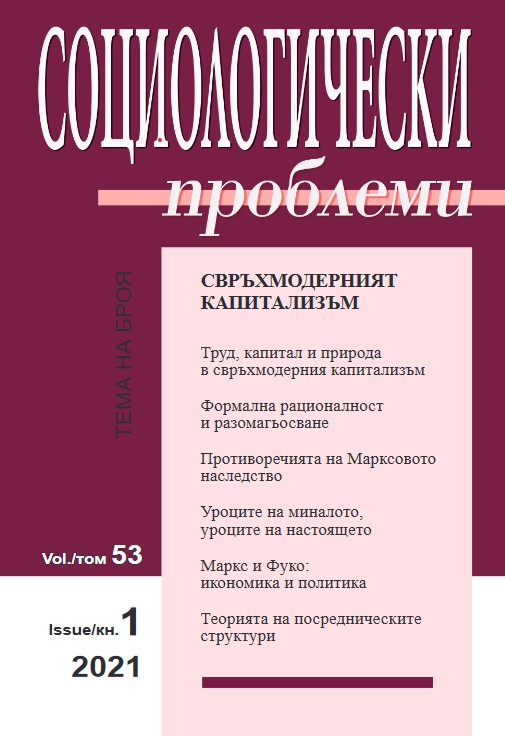Homo Datum: набелязващи се очертания
Homo Datum: Emerging Outlines
Author(s): Arto ArtinianSubject(s): Social Sciences, Sociology, Social Theory
Published by: Институт по философия и социология при БАН
Keywords: capitalism; Homo Datum; the politica; society of control; digital social objects
Summary/Abstract: What are the consequences of the foreclosure of the political in an un-free form during the epoch of supermodern capitalism? What are the implications of the emergence and general diffusion of networked digital computer technology, along with the mathematicised formal logic that underpins its functioning, in relation to this foreclosure of the political? This paper begins by tracing the ways in which (following Reiner Schurmannand Martin Heidegger) modern subjectivity – which forms the political through the functioning of the three recursive relations to, near, and for oneself – is grounded in the human being seeking meaning in making sense of the relationship with itself; the human being is the ground, the originary source for making sense of everyday life. However, another trajectory of the political emerges with the evolution of capitalism, characterized by instrumental reasoning, a form that becomes dominant in our time. Supermodern capitalism is thus characterized politically by what Gilles Deleuze called “societies of control”. In the thirty years that passed since Deleuze’ essay, what he outlined has now become more concretely perceivable. There is the fundamental change denoted by the socialization of mathematized formal logic, that underpins the now-ubiquitous digital networked computers and associated technologies and symbolic practices. The incorporation of this new formal system of reasoning into capitalist economic structures has a fundamental social impact: the generalization of instrumental-calculative reasoning into the political, which means the interruption of the formation of political subjectivity through the interruption of the movement of the recursive relations centered on the self. This interruption marks a new process of socialization, where political concepts become transformed into digital social objects. Political relations and structures are now re-forming as machinic structures– something geared towards simple usage, a mode of activation that is incompatible with thinking, or even with simple calculative reasoning – oriented towards patterns and cycles of usage, rather than human activity that is originary, and out of which follow-on social structures are derived. Such machinic structures presuppose an already-formed theoretical universal, a new origin that minimizes the necessity for thinking and originary activity(activities that are fundamental in the functioning of the political since Luther). A new subjectivity emerges, Homo Datum, a being that is decoupled from social systems into simplistic functioning as synthetic data-biological object – Being as Datum. Тhe recursive relations to oneself-as-I now return not to the ego, but to some digital social object, which is itself grounded in datum – the new origin principle for making sense of everyday life,a new metaphysical single origin of sense-making. In summary, the mature form of the society of control contains fundamental transformations: the socialization of the mathematicized formal logic, digital social objects, and Homo Datum, as a new type of political subjectivity. The foreclosure of the political, where the political has no inherent value it itself, marks a condition of deep political crisis, marked by the shift away from the self(and the “us”), and into a new external source of sense making, Data, the structures of(ordered) networked datum of generalized digital social objects. The citizen of modernity is changing into object. As of yet, it is not clear whether we are observing the historical limits of capitalism, or a new iteration in its continued persistence.
Journal: Социологически проблеми
- Issue Year: 53/2021
- Issue No: 1
- Page Range: 62-81
- Page Count: 21
- Language: Bulgarian
- Content File-PDF

